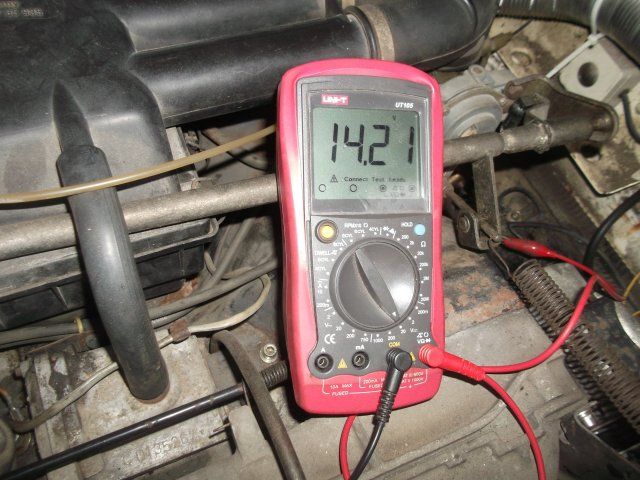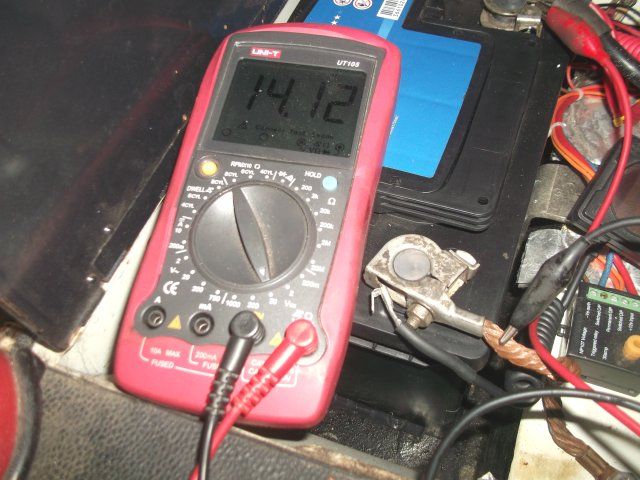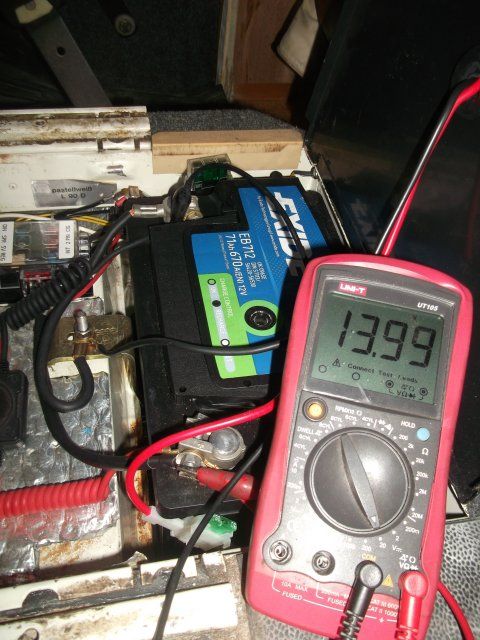Page 2 of 9
Re: Voltage drops across the entire system
Posted: 23 Nov 2014, 09:03
by ghost123uk
CJH wrote:California Dreamin wrote:a 500 watt invertor is going to pull around 40 amps at 12 volts.
Surely the inverter is only going to draw enough to supply the load that's connected to it. So if it's only connected to a 10A intelligent charger it'll draw a maximum of 10A (plus a bit for efficiency losses).
Those are the maths I was working to

bigherb wrote:ghost123uk wrote:Just a thought, though may be a daft one = I have a half decent 500 Watt 12 Volt to Mains inverter. How about disconnecting the split charge relay from the leisure battery and using it's output to feed the inverter (so it is only on when the engine is running). Then use the mains output of that to run a modern 4 stage 20 Amp(ish) battery charger connected to the leisure battery. It might work as a poor man's version of a Sterling charger ?
You shouldn't need to if the system is working correctly
Is true of course.
My first plan to get it more efficient is to take a dedicated feed from the alternator, via a better quality relay, to the leisure battery.
All this talk of mine about inverters and chargers is just "musing" really

(though I might try it out

)
bigherb wrote:Just rechecked mine.
At the alternator multimeter earth connected to the body.

At the starter battery.

And at the leisure, enough to charge the battery ok.

Those are better results than mine

(despite my cables and connectors all looking fine). I intend to do some current flow measurements today, especially into the leisure battery. Although it is only a year old and has never been run below 11.5 volts (LVD fitted) it may be drawing more current than it should and be pulling the voltage across the whole system down. All just experimenting for the sake of it (and for learning) here though.
Re: Voltage drops across the entire system
Posted: 23 Nov 2014, 11:13
by California Dreamin
Bigherbs figures look pretty good...the 14.21 figure is healthy and even the eventual 13.99 volts at the leisure is very encouraging.
I love to see 'actual' figures...we have too many speculative assumptions being banded about as fact.
Seeing the actual voltage drop across a charging system does back up some of our theories though...especially regarding imbalance of changing between batteries and ultimately the inability of the voltage regulator to fully charge them due to how it senses voltage drop and consequent control of rotor magnetic intensity/output.
I still maintain that for the ultimate health and longevity of the batteries, each battery should be charged separately (disconnected from the others) at least 3 times a year with a SMART charger.
A SOLAR panel with an intelligent twin output controller would be an alternative.
Martin
Re: Voltage drops across the entire system
Posted: 23 Nov 2014, 12:13
by WLC
.
ghost123uk wrote:
My first plan to get it more efficient is to take a dedicated feed from the alternator, via a better quality relay, to the leisure battery.
What's the point in using a relay please
 .
.
Re: Voltage drops across the entire system
Posted: 23 Nov 2014, 12:35
by California Dreamin
To keep the Leisure battery isolated from the starter battery so only the leisure is used whilst camping.
Martin
Re: Voltage drops across the entire system
Posted: 23 Nov 2014, 14:25
by WLC
.
California Dreamin wrote:To keep the Leisure battery isolated from the starter battery so only the leisure is used whilst camping.
Martin
Thanks Martin

Doesn't the split charge relay John has in his circuit separate the starter battery from the leisure battery anyway then please?
Mike
.
Re: Voltage drops across the entire system
Posted: 23 Nov 2014, 17:51
by California Dreamin
WLC wrote:.
California Dreamin wrote:To keep the Leisure battery isolated from the starter battery so only the leisure is used whilst camping.
Martin
Thanks Martin

Doesn't the split charge relay John has in his circuit separate the starter battery from the leisure battery anyway then please?
Mike
.
Read back mate....John is only getting 13.3 volts with his engine running at the leisure battery. A 20amp staged charger would increase initial charge voltage to something around 14.5 volts (depending on the spec of the charger). He is quite rightly concerned that his leisure battery will never reach 100% charge state.
Martin
Re: Voltage drops across the entire system
Posted: 23 Nov 2014, 18:20
by WLC
.[/quote]
California Dreamin wrote:
Read back mate....John is only getting 13.3 volts with his engine running at the leisure battery. A 20amp staged charger would increase initial charge voltage to something around 14.5 volts (depending on the spec of the charger). He is quite rightly concerned that his leisure battery will never reach 100% charge state.
Martin
You've totally lost me Martin

Last I heard John was going to mainline electricity into his leisure battery

via a relay

.
John's already got a split charge relay that disconnects his starter battery from the leisure battery when the engine isn't running

I am interested to know what the point of the extra relay is

That's all
 .
.
Re: Voltage drops across the entire system
Posted: 23 Nov 2014, 19:45
by California Dreamin
I know...his idea is rather complicated.
Using an invertor (12volts to 230volts) taking its 12volt feed from his split charge relay output (disconnected from the leisure battery) then the invertors mains output connected to a 20 amp staged charger which in turn is connected to the leisure battery.
One relay.
You ask WHY?
The reason is...to raise his current charging voltage to the leisure battery, which stands presently at just 13.3volts.
A 20 amp (staged) charger typically have a stage 1 (bulk charge) of around 14.5 volts, considerable higher than what he has at present.
Martin
Re: Voltage drops across the entire system
Posted: 23 Nov 2014, 20:06
by WLC
.
California Dreamin wrote:I know...his idea is rather complicated.
Martin
John's idea seems simple to me Martin.
"
My first plan to get it more efficient is to take a dedicated feed from the alternator, via a better quality relay, to the leisure battery."
.
Re: Voltage drops across the entire system
Posted: 23 Nov 2014, 20:27
by California Dreamin
So its me that has confused you not Johns idea lol....
Knowing John quite well I can see where he is coming from with this. Looking at how a Sterling 'battery to batter' charging system works I can recognise the comparisons.
Martin
Re: Voltage drops across the entire system
Posted: 23 Nov 2014, 20:45
by WLC
.
California Dreamin wrote:So its me that has confused you not Johns idea lol....
Knowing John quite well I can see where he is coming from with this. Looking at how a Sterling 'battery to batter' charging system works I can recognise the comparisons.
Martin
Yeah well whatever Martin
.
Re: Voltage drops across the entire system
Posted: 24 Nov 2014, 08:41
by ghost123uk
Yes Martin, please try and explain yourself in a clearer manner!
You'd never make a teacher with vague ramblings like those above!
In brief:- The voltage is 13.3, which if you divide it by the restive coefficient of the relay, and the wire is proportionally greater than the sum of the loss due to the initial load on the output. This in turn causes a reduction in the energy present in the electrolyte which in turn results in an increase in resistance making the losses in the input less. I intend to fit a coaxial relay in the minor circuit, this will have less lambda effect making the secondary circuit provide a higher level of wattage. The increase in voltage divided by the resistance will therefore have a positive effect on the time to charge v the time to discharge, depending on the load in amps of course.
I did consider stepping up the voltage at the alternator to 440kV and back down at the other end. I mean this is what power distribution lines do to decrease losses, so it must be a good idea.
Re: Voltage drops across the entire system
Posted: 24 Nov 2014, 08:53
by WLC
ghost123uk wrote:When I bought my new regulator it was advertised as 14.5 Volt, but on testing immediately after fitting) it was only 14.1 Volts

I would like a "proper" 14.5 Volt one, (or run the lot off a Sterling charger if I could get one for around the same price

)
What do you reckon to returning your duff alternator / regulator under guarantee for a new one John
 .
.
Re: Voltage drops across the entire system
Posted: 24 Nov 2014, 09:02
by WLC
.
ghost123uk wrote:
My first plan to get it more efficient is to take a dedicated feed from the alternator, via a better quality relay, to the leisure battery.
What's your thinking behind the relay please John
 .
.
Re: Voltage drops across the entire system
Posted: 24 Nov 2014, 09:33
by ghost123uk
WLC wrote:{color=#FFFFFF}.[/color]
ghost123uk wrote:
My first plan to get it more efficient is to take a dedicated feed from the alternator, via a better quality relay, to the leisure battery.
What's your thinking behind the relay please John

{color=#FFFFFF}.[/color]
WLC wrote:ghost123uk wrote:When I bought my new regulator it was advertised as 14.5 Volt, but on testing immediately after fitting) it was only 14.1 Volts

I would like a "proper" 14.5 Volt one, (or run the lot off a Sterling charger if I could get one for around the same price

)
What do you reckon to returning your duff alternator / regulator under guarantee for a new one John {color=#FFFFFF}.[/color]

OK, to be serious, though firstly I am intrigued by your use of "white on white" colour hex html codes to hide full stops in your posts and
all of the text in your pm's ?

= Very James Bond

(I have highlighted them by changing the bracket styles to non html above) ?
Re returning the regulator = Bought it too long ago. They might argue it was within tolerance range. Other factors, load and/or my alternator might be contributory factors. They are so cheap it's not worth the trouble (emails, post & packing) etc.
Re the relay. A normal spit charge relay only allows the 2 batteries to be linked when the engine is running and hence the charge goes to both batteries. At rest the leisure battery is isolated and only feeds your camping loads, leaving your main battery fully charged, ready to fire up the engine. I bet you knew all that

Re my "first plan" as above. A ~64 Amp red wire (6mm squared) would be added to the alternators normal ("B+") terminal and would be fed forward to the input of the split charge relay. This means the relay and hence the leisure battery would get a more direct feed with less "joins" in it resulting in less resistance and therefore less Voltage drop. In turn the resulting higher Voltage at the leisure battery (than is currently present) would provide a better/faster/more complete charge to the leisure battery. I would use a better quality relay than the one I currently have as a better quality one will have less Voltage drop through it's internal wiring and switching contact points.
So, the relay remains, to keep the circuits isolated when the engine is not running.
My proposed alternative to my "first plan" uses the split charge relay, with no extra wire from the alternator, but it's output would feed power to the inverter (instead of the leisure battery), so it automatically turns the inverter on when the engine is running. A "smart" 10 or 20 Amp mains battery charger would be run off the output of the inverter and provide "smart" charging to the leisure battery, in much the way the expensive Sterling battery to battery chargers do (more reading on them
HERE).
This last plan is more a case of musing over ideas. But the more I think about it the more I reckon I might give it a whirl as the normal charge regulation from a normal alternator is not very "smart", as in it was not really designed to charge leisure batteries, which have a different usage pattern to a stater battery.


